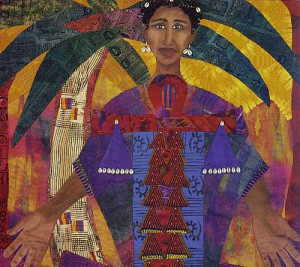
The Palm Tree
by Adriene Cruz
Ben Gurion opens his discussion on Deborah with a general observation that women’s position in ancient Israel from the time of the forefathers, was not markedly different from that of the surrounding nations. In Jewish tradition it was underscored by the fact that women were not obligated to follow most of the mitzvot and they were denied some privileges in matters such as marriage and divorce and giving testimony. Yet, Ben Gurion thought that Hebrew women had on the whole a better position than women of Canaan, Egypt, Babylon and Aram. In the first biblical story the woman, Eve is seen as the enterprising person and not Adam; the foremothers as well had qualities that the forefathers did not display, Rebecca for example, emerges as more impressive and dynamic than Isaac, and Sarah measures up to Abraham in significant ways.
Women’s occasional yet legitimate high status and importance is seen most clearly among the prophets since “prophets are the moral and ethical voice,” it is the prophet, who in Jewish tradition was seen as the spiritual guide and authority – not the king, the political leader, or the high priest. And in biblical Israel there have been not only men prophets, but women prophets as well: Miriam, Deborah, Hulda and Noadia. The most famous and celebrated was clearly Deborah. Ben Gurion lamented the fact that the biblical narrative did not offer details about Deborah’s life, how she came to be a famed judge, and gives only a brief sentence that the Israelites came from all over the country to the place where Deborah held court and adjudicated under the palm tree between Rama and Bet El.
Deborah, remarkably, occupied numerous positions. In addition to her roles as prophet and judge she was also the first woman military commander who mobilized 10,000 warriors in the war with the king of Hatzor. She appointed Barak to be the field commander and he responded, “If you go with me, I will go. If you will not go with me then I will not go.” Ben Gurion saw in Barak’s response the deep respect that people had for Deborah in all of her positions, including that of a military leader who gives the orders and Barak executes them on the battlefield. Her words, “they stopped living in unwalled towns in Israel, they stopped; until I, Deborah arose; I arose as Mother in Israel,” were not vain boasting but real facts of the time. These words about herself she included in her famous poem, which Ben Gurion said revealed her talent as a distinguished poet. Deborah’s poem (Judges, 5) “is not only a significant historic document but a tribute to her, a woman of valor with rich creative powers.”
Deborah has been “a legendary woman of exceptional human talents: she had vision, courage, leadership, prophecy, military acumen, the gift of poetry and a generous heart.” All of these have given her a most compelling ethical, political and military authority at a time in biblical Israel of great turmoil and lack of leadership.
Great leaders in Jewish history, like Deborah, emerged in stormy times and inspired Ben-Gurion, a great leader in modern turbulent Jewish history, who acted with courage and wisdom, vision and leadership, and became the architect of the renewed state of Israel.
***
Translated from the Hebrew by Ayala Emmett